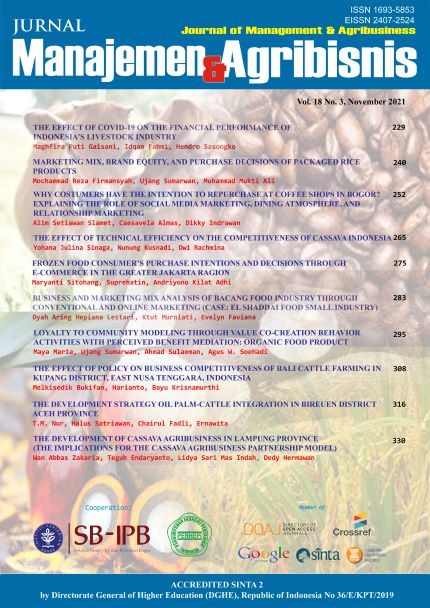Loyalty to Community Modeling Through Value Co-Creation Behavior Activities With Perceived Benefit Mediation: Organic Food Product
Abstract
The current trend of people's lifestyles is to start consuming foods that are safe and environmentally friendly. The development of information on the usefulness of organic products more broadly becomes necessary. This study aims to determine the impact of value co-creation activities on loyalty to community, mediated by perceived benefit value. The analysis tool used in this study is Structural Equation Model (SEM) analysis. The sampling method used is a convenience sampling approach with 385 respondents. The results show that consumer perceived benefits value have a strong effect on loyalty to the community. In addition, value co-creation activities in the community is shown to be measurable by customer participation behavior and customer citizenship behavior to obtain the desired perceived benefits. The role of the community with the support of the loyalty of its members can be an effective means of disseminating knowledge about organic food products more broadly to the public. Having these results, the recommended policy direction is to increase the perceived benefits of customer community participation and citizenship. Further studies are needed to refine and build a more comprehensive model that integrates other theoretically related constructs.
Keywords: customer participation behavior, customer citizenship behavior, loyalty to community, organic food products, perceived benefit
Authors
Authors who publish with this journal agree to the following terms:
- Authors retain copyright and grant the journal right of first publication with the work simultaneously licensed under a Creative Commons Attribution License that allows others to share the work with an acknowledgement of the work's authorship and initial publication in this journal.
- Authors are able to enter into separate, additional contractual arrangements for the non-exclusive distribution of the journal's published version of the work (e.g., post it to an institutional repository or publish it in a book), with an acknowledgement of its initial publication in this journal.
- Authors are permitted and encouraged to post their work online (e.g., in institutional repositories or on their website) prior to and during the submission process, as it can lead to productive exchanges, as well as earlier and greater citation of published work (See The Effect of Open Access).

